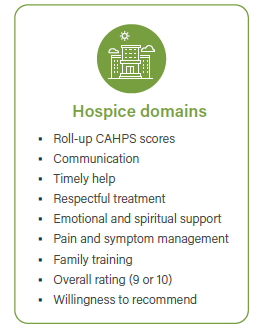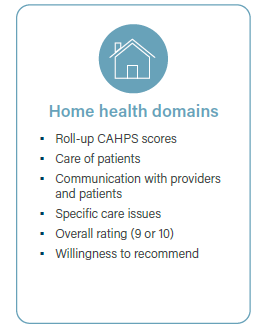by Kristin Rowan, Editor
Quality Improvement Project
Joint two-year effort publishes results
The Quality improvement project, a joint two-year research initiative between BerryDunn, Strategic Healthcare Partners, and National Alliance for Care at Home, aimed to improve the care experience for patients and improve CAHPS scores. The study implemented best practices targeted toward the CHAPS survey to see what really was working in improving patient and family satisfaction.
“Very little research has been done in the area of home health and hospice CAHPS, and this project is helping to close that gap. By identifying and validating true best practices, we’re giving agencies actionable tools to improve patient and family experience. At the heart of care is the relationship between providers, patients, and families—and improving that experience is essential to achieving meaningful outcomes.”
The Quality Improvement Project
The study included 27 hospice and 36 home health agencies. It ran from October of 2023 through June of 2024. Participating agencies underwent supervisory training and support, customer service and PCC training and support, and patient-centered mentorship certification. They also participated in bimonthly review calls for performance metrics and best practices.
Data comparisons
CAHPS data collected between June 1 and December 31, 2023 served as a baseline to compare with data collected using best practices. New CAHPS data collected between June 1 and December 31, 2024 showed outcomes of the project.


Best Practice Findings
- Before funding new or additional initiatives, ensure internal readiness and operational stability to ensure successful implementation
- Customer service training improved CAHPS outcomes in communication and willingness to recommend
- Supervisory training improved roll-up scores for hospice and both specific care issues and willingness to recommend for home health
- Mentorship boosted overall scores in hospice, but had little impact in home health
- Home Health agencies may benefit from mandated interdisciplinary team meetings for mentorship, peer connection, and ongoing staff education
- Turnover rates had mixed results
- Intentional staff changes due to performance issues increased scores
- General high turnover disrupted continuity and long-term success
Key Takeaways/Conclusions
Implementing patient-centered care (PCC) yielded strong improvement in some areas for some organizations, but overall the project produced varied results. The project was more successful among hospices than home health agencies. PCC training will need changes to achieve measurable impact. The best results came from agencies with the highest participation rates. Further improvement efforts need to be tailored to agency types, cultures, dynamics, and internal barriers.
# # #
This report and the information contained therein is the property of BerryDunn. For more information, contact BerryDunn directly. Download the full report here.



